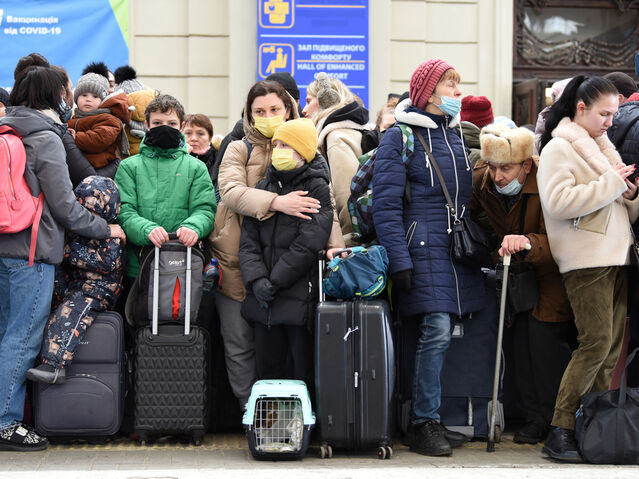Health
How Can We Support the Wellbeing of Ukrainian Refugees?
Lessons from other refugee crises can help us meet the needs of Ukrainians.
Posted April 5, 2022 Reviewed by Abigail Fagan
Key points
- Given a safe and supportive environment, the majority of refugees will recover from trauma exposure without professional mental health treatment.
- The priority now should be on helping Ukrainian refugees feel safe and supported, materially and psychologically.
- Loss is endemic among refugees. Grief is a normal response to loss. Only when it persists and impairs functioning is it considered a disorder.
- Supporting refugee parents, who are coping with persistently high stress, may be the best way to foster healing and resilience in their children.

Seven weeks into Russia’s invasion of Ukraine, an estimated 10.5 million Ukrainians have been displaced from their homes and communities by the extraordinary violence: the shelling of cities and the intentional targeting of civilians, the widespread destruction of homes and communities, physical abuse and torture, and sexual assault used as a weapon of war.
The majority of Ukrainians displaced by the war are still living in their homeland, seeking shelter from the ongoing violence and trying to access desperately needed aid. Like internally displaced populations in other wars, Ukraine’s “internal refugees” remain vulnerable to ongoing military attacks, and many are sheltering in parts of the country that are difficult for aid organizations to reach.
For the more than four million Ukrainians who have fled into neighboring countries and beyond, their experience as refugees presents a host of challenges to their wellbeing, and specifically to their mental health. My aim in this post is to highlight a few common features of the refugee experience that can inform efforts to support Ukrainians as they adapt to life in exile.
1. Psychological trauma or PTSD among refugees is a real and pressing concern; however, its prevalence among refugees is often overstated. A recent WHO review of mental disorders in war-affected populations found an average PTSD rate of 15.3%, far higher than in populations unaffected by armed conflict (3.6% in the US), but far lower than estimates of 33-50% found in some studies and on social media. This discrepancy is due at least partly to research methods that over-estimate the severity and frequency of trauma symptoms, or that diagnose PTSD (or “probable PTSD”) based on insufficient evidence or using questionnaires that have not been validated for the population at hand. Although many refugees experience transitory symptoms of PTSD, given a safe and supportive environment, the majority will eventually recover without professional mental health treatment.
Implications:
For Ukrainian refugees, this means that we need to prioritize providing safe and supportive environments. This starts with meeting basic needs: adequate shelter, food, healthcare, secure legal status, and opportunities to create social support networks with other Ukrainians and with members of the host society. Basic information about how to access social, medical, educational, and legal services can go a long way towards lowering anxiety, while community centers, religious settings, and social gatherings can foster supportive networks that reduce isolation, and allow for the sharing of experiences, information, and resources. Providing simple techniques to help manage transient stress reactions, in adults and their children, can also be of great value. In my research team’s experience with Syrian refugees in Lebanon, we found that simple and brief adaptations of basic mindfulness exercises (e.g., focusing on one’s breathing while slowing down the exhale, mindful walking) were helpful in lowering stress, improving sleep, and improving general wellbeing among highly stressed parents. As parents' own mental health improved, they became gentler and more patient with their children.
A sizable minority of refugees will experience symptoms of PTSD that do not ease with the passing of time. Examples of PTSD symptoms include flashbacks, recurrent nightmares, an inability to relax, depressed or irritable mood, and an avoidance of anything that recalls the trauma. There are numerous evidence-based treatments for PTSD, and referral to a clinic that has the resources to work with Ukrainians can be helpful. Such resources include experience working with refugees, Ukrainian-speaking clinicians or interpreters, and case workers who can help connect refugee clients to other types of resources that may alleviate stress and support their healing. It's important to remember though: the development of PTSD isn't just a result of the experiences people have endured in their homeland; it also depends, for many, on whether they find the safety and support as refugees that will allow them to recover from the horrors they have experienced.
2. Loss and grief are endemic among refugees. Grief is not a psychological disorder (although Prolonged Grief Disorder is—more on that below); rather, it is a normal human response to loss, and refugees have lost so much: loved ones killed or left behind, or resettled elsewhere; homes and possessions; social and professional roles; and the experience of home—that feeling of being in a place where one belongs and to which one feels a deeply rooted sense of connection.
What do refugees leave behind? Nearly everything.
Implications:
Recognizing the pervasiveness of loss and grief among Ukrainians is important. Making space for sadness and grief when they arise can be very helpful, and is something anyone supporting Ukrainian refugees can do. We never want to be intrusive, and asking about war experiences is risky and not advised; if people want to talk about the war, that’s fine, but, especially at this early stage, it’s important to follow their lead, and not invite disclosure about painful events. On the other hand, asking about refugees’ lives before the war can be an invitation to share deeply valued parts of their non-refugee identities, the treasured roles and activities and places they’ve left behind, and to which they are likely hoping to eventually return.
We often believe we need to “do something” when people experience sadness. We forget that listening with empathy and respect is actually the very thing we most need to be doing. And when there are opportunities to connect refugees with similar experiences and settings to those they have left behind (a chess club, a football league, an art center, a yoga studio, a dance center, a community farming cooperative), by all means, making such connections can be enormously helpful.
It is also helpful to work with parents on how to support their children around experiences of war-related violence and loss. There are numerous resources on this topic, to which I have included links below.
We often believe we need to “do something” when people experience sadness. We forget that listening with empathy and respect is actually the very thing we most need to be doing.
Although grief is not a disorder, in some cases it can become one: prolonged grief disorder (PGD). Research to date suggests that when grief does not abate with the passing of time, and when it significantly interferes with daily functioning, people may be stuck in a form of traumatic or complicated bereavement. In such cases, referral to a mental health professional can be helpful. Religious leaders can also play a powerful role in helping the bereaved come to terms with painful and even traumatic losses, offering frameworks of meaning, rituals to honor the dead, and a supportive community.
3. It’s essential to provide opportunities for refugees to build new lives in exile, even if they may eventually return home. Work generates income, which not only allows refugees to rent or perhaps buy their own homes, but also to begin creating new life projects—a powerful antidote to the pain of loss.
Implications:
Allowing Ukrainian refugees to work, as the European Union has agreed to, is not only a win-win situation financially (the EU needs workers, and Ukrainians need work); it is also a powerful buffer against distress. Permitting refugees to work supports their dignity, autonomy, and eventual integration. Denying refugees the right to work, conversely, fosters dependence on aid, increases their poverty, and heightens stress, which in turn can lead to anxiety and depression, as well as an increase in family conflict and violence.
4. Refugee children can be supported in at least two key settings: at home and at school. Numerous studies have shown that refugee parents experience persistently high levels of stress and distress, related not only to the violence from which they have escaped, but—even more powerfully—to the everyday challenges of adapting to life in exile. Heightened parental stress and distress can lead to an increase in harsh parenting, and a decrease in warm and responsive parenting, both of which can have lasting negative effects on children’s mental health and psychosocial development. Moreover, children—especially very young children, respond with great sensitivity to signs of distress in their parents, particularly if such distress leads to moments of dissociation, sudden anger, or psychological unavailability.
Fortunately, studies have shown that improving refugee parents’ psychological wellbeing leads quite rapidly to improvement in their children’s mental health as well. Strengthening parents’ wellbeing can be achieved in various ways: by helping them manage the numerous post-migration or resettlement stressors they are dealing with (e.g., social isolation, language barriers, financial stress), by offering stress management interventions tailored to the needs of refugee families, and by referring severely or persistently distressed parents to professional mental health services. There is also growing evidence that trained community members can effectively implement brief but impactful mental health interventions with conflict-affected adults, including refugees.
Although some refugee children may need professional mental health services, particularly if they have been traumatized by extreme acts of violence, the majority of displaced children appear to be resilient and, like other children, respond well to the reestablishment of safe and supportive family environments. Strengthening and supporting refugee parents must therefore be a top priority.
Finally, schools offer refugee children structure and positive routines, opportunities for social interaction with peers, mastery of the local language, and a sense of hope for the future. Education is fundamentally future-oriented, helping prepare students for academic and professional success. For children who have left so much of their world behind, this sense of hope can be a powerful antidote to anxiety and despair. It's important for school personnel to be familiar with signs that a refugee child may be experiencing distress, whether rooted in war-time experiences or in dynamics at home. It’s also key for school staff to actively encourage supportive and welcoming attitudes among host-society students towards their refugee peers; anti-refugee discrimination turns out to be a powerful source of distress among refugee children.
Resources for supporting the mental health of Ukrainian refugees:
- MHPSS.net is a wonderful online resource for humanitarian workers, refugee parents, and beyond, with lots of resources specifically for supporting Ukrainians.
The MHPSS.net Briefing Kit for Ukraine Humanitarian Crisis - Emotional Support Hotline for Ukraine, run by the Institute of Migration (IOM) has four operators, seven psychologists, one psychiatrist, provides confidential support to Ukrainians. From within Ukraine, the number is 0 800 211 444. The country code from outside Ukraine is 380.
- AMNA, previously called Refugee trauma Initiative, is an organization that provides trauma-sensitive mental health and psychosocial support to refugees, including displaced Ukrainians within and outside of Ukraine.
- The National Child Traumatic Stress Network has links to wonderful resources covering a wide range of useful topics, from talking with children about war, understanding age-related reactions to traumatic events, and a guide to Psychological First Aid, a set of principles and practices for supporting people recently exposed to humanitarian crises.
- Save the Children, a global NGO, is providing a wide range of material and psychosocial assistance to Ukrainians displaced by the war. Numerous other NGOs are also providing support during the Ukraine crisis, including SOS Children’s Villages, and a host of others, with details and a comprehensive list available at Interaction.
- To find a therapist, visit the Psychology Today Therapy Directory.




